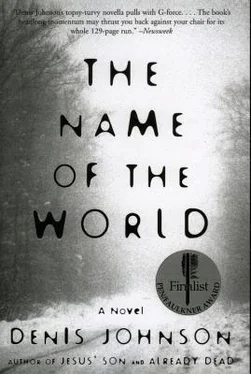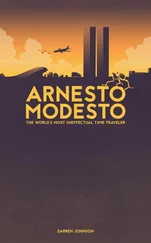In my head I talked to her as much as I did anybody else, as much as Bill the museum man, even more. You, I told her. You act wild and it’s not fake. You have a kind of blessed ignorance. You are California. What do I mean you are California? I asked her. You’re long and your variousness sweeps down to the Pacific Ocean. There’s no reason not to say these things when nobody’s listening.
Tapping on the glass seemed wrong: I’d only have succeeded in troubling her, probably — a figure in an alley, tapping. On the other hand, that figure was pretty much who I was.
I went around to the building’s entrance to see if I could find her and say hello. The lobby was polished wood and brass — luxurious, silent. I was alone. Not even a concierge or a night clerk. From the front desk I could see back into the office now, where she sat beside her vague reflection in the window.
It was somebody else entirely, a woman quite a bit blonder and with a face deeply tanned for this time of year, working late, taking a minute for her thoughts. It wasn’t Flower Cannon.
I stared at her until a man who appeared to have no function whatsoever here approached me and said, “Sir, we’d rather you didn’t smoke inside the lobby.”
A light sleet was falling as I came out of the hotel. I stepped backward under the awning and watched out for J.J. I thought about my wife. Whereas before I’d chased away any memories of her, now I found myself catching at what I could, and it was less and less. Anne drank a lot of black coffee. She liked cinnamon-spiced chewing gum. Anne was thin, intelligent, humorous, sweet. She fidgeted. She cleared her throat a lot. She frowned when something struck her as funny. Human stupidity tickled her, she wore the world lightly, and that was important to me. I needed her. In the heights and depths, in the most silly and trivial ways, she was my wife. And now here was Flower Cannon.
I wouldn’t say I was infatuated. I had noticeable but manageable feelings for her, helpless lustful feelings, and fatherly feelings, and the mild resentful envy of someone no longer young for someone so full of vitality. Feelings not at all different in kind from those I entertained for every young woman in the world — different however in degree; stronger.
Women had always appeared fair to my eyes. Yes, college girls, and even the high-school girls I once taught. But much of that evaporated when I became a father to my own little girl. Now every woman looked like somebody’s daughter. And after I lost her, they all began to look like my own daughter — to look like Elsie, inhabiting her years, filled with my daughter’s unlived life, Elsie seeking something out of their eyes.
Curious to say, her name wasn’t Elizabeth, or anything else to do with Elsie. She was Huntley, a name arguably a lot nicer, but as a baby she had a stuffed animal — these days they call them “sleeping animals”—named Elsie by the manufacturers, and labeled Elsie across her bearish belly. In that world, in the baby’s crib, in that epoch, identities flowed back and forth. There weren’t even fantasies then — all was fantasy. Through a kind of enchantment the child Huntley appropriated Elsie the bear’s name, and kept it. The bear kept it, too. Everybody ended up Elsie, all the sleeping animals, also Anne. And for a little while even I was Elsie.
Everything became Elsie, and in a manner of speaking everything still is. In losing Anne I’d lost the woman in my life. But in losing Elsie, I’d lost all of us.
“Mike?” It was J.J., standing in front of the Italian place looking right and left and pulling on a pair of gloves. “He arrives!” he said to me. I went carefully down the slick steps.
Now, in this season of return, I felt myself becoming less and less Elsie and more and more Mike Reed. Less the man who’d lost his family, and more just somebody who didn’t happen to have one.
“It’s funny,” J.J. said, the sleet landing and melting on his shoulders, “Trevor Watt was a teacher of mine, my most important teacher. For a while he was the most important person in my life. I mean, you know, I pored over every nuance. Do you know how it can be with a teacher, and you’re young, you’ve got nothing yet, only what he confers on you? Every word he said was gold. Then suddenly I hated him. He betrayed all my worship. He didn’t mean to. He just turned out to be human. And I burned with hatred for the guy. I wanted him dead. And when those people tonight mentioned his name, and now he is dead…I suddenly realized I hadn’t thought of him since…I couldn’t even tell you. It’s been years.”
When J.J. dropped me at my house, I didn’t invite him inside. I made no excuse, though he actually got out and walked me to the door. We stood listening to the noise of a party across the street, students, surely, exploding after their midterms: a repeatedly banging screen door, and laughter, and the thump, thump, thump of their music.
J.J. jammed his gloved hands into the pockets of his leather jacket and said, “Ah! Youth.”
A white car, one from the early seventies, a big old Moby Dick of an automobile, whizzed around the corner onto our block, blew a front tire with a cheerful plopping noise, and went into a pirouette that ended with the rear wheels on the sidewalk, where they spun angrily until they found a purchase and the vehicle shot into the street again, then stalled. Apparently satisfied with this as a final position, as a parking place, very nearly in the middle of this dead-end street, two young men got out with deliberate movements and stumbled toward the house where the others laughed.
J.J. said, “Hey — fellas — excuse me—”
They wandered on inside, and he shouted louder, “Hey!” and then screamed, “HEY—” and stopped himself.
For a few seconds we were silent. The noise of the party went on unabated. “I wouldn’t want to repeat my younger days,” I said, trying to sound sympathetic.
“Ah, well,” he said. He smiled. In the light of streetlamps tears shone in his eyes. “I’m off,” he said. “Thanks for the company.”
“Any time. Really.” I thought it very possible we’d see more of each other, two single men.
The ticking sound of the frozen rain stopped an hour or so after it started. The party down the block careened on through the night. For better than two years now this generally quiet section of town had been my neighborhood. I had an entire small house to myself. I slept in an attic bedroom. I kept the window wide open because it was always warm up there. The street dead-ended at some railway tracks, but apparently there were more important routes through town, because we hardly ever heard a train go by.
I lay in bed under the low ceiling and listened to the party across the street as the music got lower, as the number of voices diminished, although the voices themselves carried more clearly as the night grew deeper. Along about three in the morning I was wakened by shouts in the street.
“SEND OUT YOUR WOMEN!”
“SEND OUT YOUR WOMEN!”
They made this request over and over and over. A couple of young men, from the sound of them, maybe the same two young men who’d sailed on three tires down the middle of the neighborhood. They screamed for a good half hour, taking turns mostly, sometimes hollering simultaneously but by no means in unison, catching their breath and laughing and talking together, and then starting up again:
“SEND — OUT — YOUR — WOMEN!”
“SEND! OUT! YOUR! WOMEN!”
“SEND! — OUT! — ” until they were hoarse.
This performance brought on the full spring. Over the next few weeks the students put melted-looking divans on the porches of their rooming houses, threw away their books and shoes, and got out their guitars. You could sit by an open window in the dusk and hear their whoops and laughter like the cries of wildlife. They were forever flitting over the flat dead lawns uncovered by the thaw, tossing baseballs, Frisbees, water balloons. They lay by the river in pairs, drove slowly down the streets in open convertibles playing loud rap music, like old-time loudspeaker trucks advertising humanity’s least attractive secrets. I enjoyed all this. I liked the young students. I think my first spring here, they saved my life.
Читать дальше











